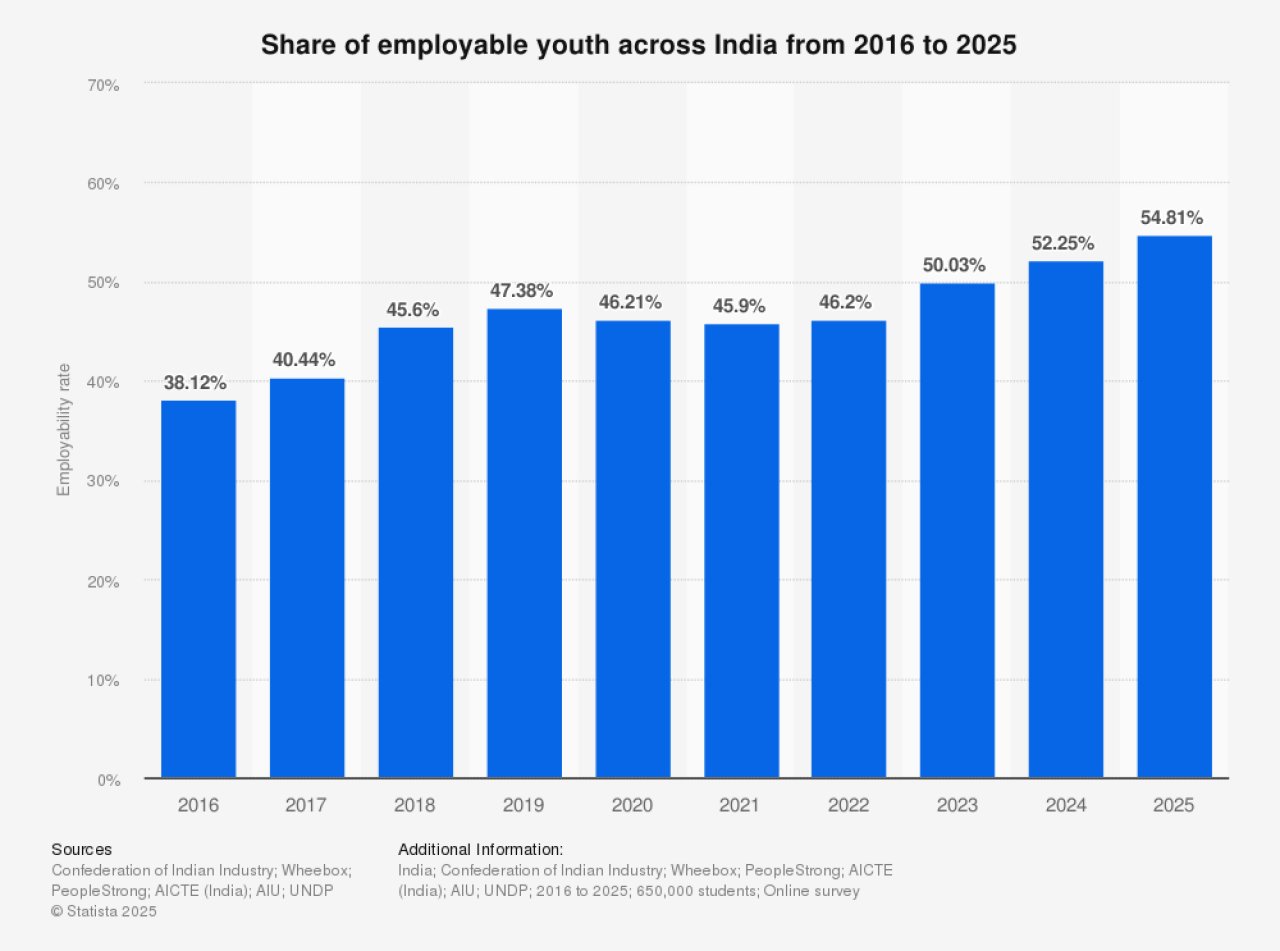Bridging the Employability Gap: Why Indian Universities Need to Focus on Youth Employability Skills

In today's rapidly evolving global job market, the gap between academic education and workplace readiness has never been more apparent. The India Skills Report 2025 reveals critical insights about the employability of Indian graduates, highlighting both progress and challenges that universities must address to prepare students for successful careers.
The Current State of Employability in India
According to the comprehensive Wheebox Global Employability Test (G.E.T.) administered to over 6.5 lakh candidates, India's national employability rate stands at 54.81%. While this represents improvement over the past decade (up from 33% ten years ago), it still means nearly half of Indian graduates lack the skills employers demand.

Figure 1: India's employability rate has shown steady improvement over the past decade, rising from 38.12% in 2016 to 54.81% in 2025.
Source: India Skills Report 2025
The report highlights significant variations across educational domains:
- IT and Computer Science graduates lead with impressive employability rates of 75% and 78% respectively
- Engineering graduates show strong employability in Electronics (72%), Electrical (68%), and Biotech (65%)
- MBA graduates demonstrate high employability at 78%
- However, general degree programs like B.A. (54%) and B.Com (55%) show only moderate employability
This disparity reveals a concerning trend: specialized technical programs are better preparing students for the workforce than traditional degree programs, which continue to enroll large numbers of students.
Regional Disparities in Employability
The report also uncovers significant variations in employability across states:
- Maharashtra leads with 84% employability
- Delhi (78%), Karnataka (75%), and Andhra Pradesh (72%) follow
- States like Tamil Nadu (64.06%) and Gujarat (62%) show potential but require focused improvement
These geographical discrepancies point to inequalities in the quality of education and skills training across different regions of India, highlighting the need for standardized approaches to employability skills development.
The Skills Employers Are Demanding
What skills do employers value most? The India Hiring Intent Early Career Edition Survey 2025, which gathered insights from over 1,000 corporations across 15 industries, provides clear answers:
- Ethics - Rated as "extremely important" by 100% of employers
- Collaboration - Considered "very important" or "extremely important" by 92% of companies
- Adaptability & Problem-solving - Valued highly by 85% of employers
- Engagement and communication skills - Rated as "very important" by 77% of respondents
- Self-efficacy - Considered essential by 92% of employers
- Digital literacy - Growing in importance with 77% rating it important or extremely important
Notably, while technical skills remain valuable, employers increasingly emphasize soft skills and character attributes as critical differentiators when hiring fresh talent.
The Global Mobility Opportunity
The 2025 report highlights "Global Talent Mobility" as a key theme, noting that Indian professionals are increasingly sought after internationally in fields like:
- Information Technology and cybersecurity
- Healthcare and biotechnology
- Engineering and renewable energy
- Finance and fintech
- E-commerce and digital marketing
This creates unprecedented opportunities for Indian graduates who possess the right skill sets. Universities that prepare students for global careers stand to significantly enhance their graduates' prospects.
The AI and Automation Challenge
The report also reveals that 38% of companies plan to increase their use of AI in recruitment processes in 2025. This trend will transform how candidates are screened, assessed, and interviewed, making digital literacy and adaptability even more crucial for job seekers.
Sectors like BFSI and IT are leading this trend, with 100% of BFSI respondents planning to use AI for interviews and 67% of IT companies leveraging AI for hiring recommendations.
When Are You Making Your Students Ready?
In light of these findings, universities face a critical question: Are your students prepared for this rapidly changing landscape?
The data clearly shows that possessing a degree alone is insufficient. Universities must:
- Integrate employability skills into their curriculum, focusing on both technical competencies and essential soft skills
- Foster industry partnerships to ensure curricula remain relevant to real-world demands
- Provide practical experience through internships, projects, and work-integrated learning
- Develop global competencies to enable students to thrive in an increasingly borderless job market
- Embrace technology to prepare students for AI-driven recruitment processes
The Cambridge Veritas Solution
The Cambridge Veritas Youth Employability Skills (CYES®) program is designed to bridge this critical gap between academic education and workplace readiness. Through our strategic B2B partnerships with universities across India, we provide:
- Industry-aligned employability skills training
- Practical workplace scenario simulations
- Soft skills development workshops
- AI and digital literacy modules
- Global competency certification
Our program has helped partner universities significantly increase their graduates' employability rates, placement statistics, and starting salaries.
Get in Touch for a Partnership
Is your university ready to transform how it prepares students for the workforce? The India Skills Report 2025 makes it clear that institutions must act now to remain competitive and serve their students effectively.
Partner with Cambridge Veritas to implement the CYES® program at your university. Together, we can ensure your graduates don't just earn degrees but develop the comprehensive employability skills demanded by today's employers.
When are you making your students ready? Get in touch for a program partnership with your university today.
Based on data from the India Skills Report 2025, analyzing the employability of over 650,000 candidates through the Wheebox Global Employability Test and insights from 1,000+ corporations across 15 industries.














.png)
Cambridge Veritas
An awesome post!
Krishnatrya from Cambridge Veritas
Thanks! I had fun writing it.
Parshant Gill
The content was well-organized, informative, and easy to follow. I appreciate the attention to detail and the value it provides. Definitely recommend it!